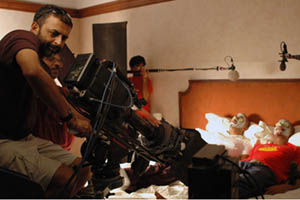Loins of Punjab Presents Manish Acharya
It is no surprise that Loins of Punjab Presents (Manish Acharya) is a big hit in India, is the highest-rated comedy of all time on AllBollywood.com and is finally tickling the fancy of American audiences. In a recent daily article we covered the screening and great experience of meeting the cast and crew after the film. The film carries so much ambition and character on its own as we watch the Desi Idol contestants compete, each individual full of talent or mischievous ploys to win. The great song and dance scenes will remain in my mind as a vision of great cinema. It was a special treat to interview Manish who not only directed, but also co-wrote, produced and acted in the film! All characters were fabulously daring, funny or unique and Vikram (Manish’s character) was the one who found himself most entangled in a Bollywood-style love scene. I won’t give away anything more, but it was a great delight to hear about what he experienced as director of the film and the meanings Loins of Punjab Presents has in the South Asian American and universal community!
Writer-director, Manish Acharya, is a multiple award winner from the NYU Tisch School of the Arts Graduate Film program. Along with a MFA in Film Directing, Manish also has degrees in Physics and Industrial Relations. Before NYU, he was the founding member of a successful software company that went public in 1998. At NYU, Manish directed three short films. His film “partner” (2001) won the Carl Lerner Award for a Film with Social Significance, as well as multiple awards for acting and editing. His latest film, “LOINS OF PUNJAB PRESENTS,” was presented the Dennis Riese Award by NYU faculty, and has won the Best Feature Film award at the 65th Annual First Run Film Festival. Currently, Manish divides his time between Mumbai and New York.
ASIANCE: During the Desi Idol competition the contestants all compete to win at singing and performing while showcasing their identity and culture. In your opinion, what is the ultimate form of finesse the individuals were trying to achieve? How was each goal different and why did you choose these specific characters to represent the variety of characters?
Manish Acharya: The thing that started this entire project going was a conversation in a Starbucks in midtown about the kind of people that might take part in a Bollywood-style singing contest. And we wrote these characters as individuals and not as representatives of a particular sub-section of the culture. So to answer your last question first, I didn’t choose these characters to represent a variety, they chose to be in the story. And somehow because we made them so specific, their appeal became universal.
At a very common level, all these characters want to win the contest and win the $25000 for very different reasons. For Mrs. Kapoor, it’s a way to proclaim Queen Bee status in her socialite group. For Vikram, it’s a financial necessity in the period of his unemployment. For Preeti, it’s a launching pad into the professional world of singing. For Josh, it’s a way to finance his dream of Joga. However, we see that what the characters want and what they need is not always the same, and this provides the dramatic and comedic tension which takes the movie to its eventual conclusion.
ASIANCE: What was your method used to direct and obtain the best comedic timing with the actors (the film has great comedy!)
Manish Acharya: I told all the actors that the characters are deadly serious. This is not funny for them. If a guy slips on a banana peel, it’s not funny for him. I think great comedians (Chaplin, Keaton, etc.) understood this. In LOINS, if the actors starting “playing for laughs,” I would stop them and make them go back to being “serious” about their character. The laughs come from the funny situations that these serious characters find themselves in.
Watch the trailer
ASIANCE: As an actor yourself what was the challenge in finding that balance while also being in charge of others?
Manish Acharya: The toughest thing was not having a director that was completely focusing on my performance and giving me tips to better it. So that was hard. Fun, but hard.
But I think my time as an actor benefited the other actors, as I was a more empathetic director because of my acting experience.
ASIANCE: For Desi women, what do you think is the biggest difference in terms of beauty and ritual between America and South Asia? Do you think it is easy to maintain cultural appreciation and habits?
Manish Acharya: I think that often, once we leave our home country, we are more attuned to its rituals and cultural habits, as we can no longer take them for granted. A lot of this movie, at a subtextual level, is about that … about home, and defining a home away from home, and about cultural insiders and outsiders.
ASIANCE: Do you believe this film will open doors to include more Desi themes in the mainstream Hollywood and break down stereotypes? I hope so!
Manish Acharya: I hope so too. I think if the movie does well at the box office, it will definitely make people see South Asians in a different way. And it’s about time.
Please do call me if you would like me to elaborate on any of the above.
Visit Manish’s www.myspace.com/manishacharya


